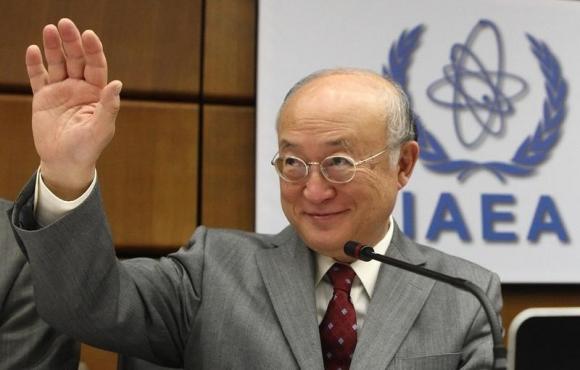 International Atomic Energy Agency (IAEA) Director General Yukiya Amano waves as he arrives for a board of governors meeting at the IAEA headquarters in Vienna June 4, 2014.
International Atomic Energy Agency (IAEA) Director General Yukiya Amano waves as he arrives for a board of governors meeting at the IAEA headquarters in Vienna June 4, 2014.CREDIT: REUTERS/HEINZ-PETER BADER[/caption]
(Reuters) -�Iran�has refrained from expanding tests of more efficient models of a machine used to refine uranium under a nuclear agreement with six world powers, a U.N. report shows, allaying concerns it might be violating the accord.
Tehran's development of advanced centrifuges is sensitive because, if successful, it could enable it to produce potential nuclear bomb material at a rate several times that of the decades-old version of the machine now in use.
An interim accord in 2013 between�Iran�and the United States,�France,�Germany, Britain,China�and�Russia�stipulated Tehran could continue its "current enrichment R&D (research and development) practices", implying they should not be stepped up.
But a U.N. nuclear agency report in November said�Iran�had been feeding one of several new models under development, the so-called IR-5 centrifuge, with uranium gas, prompting a debate among analysts on whether this may have been a violation.
A confidential document by the International Atomic Energy Agency (IAEA), distributed among its member states on Thursday and obtained by Reuters, showed the IR-5 had been disconnected.
"The disconnection reflects�Iran�addressing concerns about its enrichment (of uranium)," said the Washington-based Institute for Science and International Security (ISIS), which closely tracks Iran's nuclear program.
"The disconnection provides additional confidence that�Iran�is abiding by its commitments under the Joint Plan of Action," it said, referring to the 2013 agreement. Still,�Iran�has stalled the U.N. inquiry in other areas.
International talks are resuming in Geneva on Friday with the aim of narrowing remaining gaps in negotiations to end Iran's 12-year standoff with the six powers.
The deal sought by the powers would have�Iran�accept limits to its uranium enrichment capacity and open up to unfettered IAEA inspections to help ensure it could not put its nuclear program to developing bombs. They also want�Iran�to resolve all IAEA questions to build trust in its nuclear aspirations.
In return,�Iran�would see a lifting of international trade and financial sanctions that hobbled its oil-based�economy.
The IAEA document about the U.N. inquiry, which has run parallel to the big power talks, was issued to IAEA member states only weeks before a deadline in late March for a framework agreement between�Iran�and the powers. They have set themselves a deadline for a final deal at the end of June.
By Reuters










